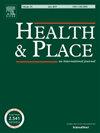Neighborhood environments underpin screen time intervention success in children: Evidence from a study of greenspace and community programming across 130 US communities
IF 3.8
2区 医学
Q1 PUBLIC, ENVIRONMENTAL & OCCUPATIONAL HEALTH
引用次数: 0
Abstract
The goal of this study was to understand how neighborhood greenspace access may support or hinder the effectiveness of community programs and policies (CPPs) aimed at reducing racial and ethnic inequities in screen time among 4598 US children. We found higher CPP intensity was significantly associated with fewer screen time behaviors in high greenspace neighborhoods, but not neighborhoods with low or moderate greenspace. Moreover, there were significant differences in greenspace access by neighborhood-level race and ethnicity. Implementing CPPs without regard for racial and ethnic greenspace inequities may be an underlying cause in the perpetuation of inequities in childhood screen time.
邻里环境是成功干预儿童屏幕时间的基础:来自美国 130 个社区的绿地和社区计划研究的证据
本研究的目的是了解社区绿地的使用如何支持或阻碍旨在减少 4598 名美国儿童屏幕时间的种族和民族不平等的社区计划和政策(CPPs)的有效性。我们发现,在高绿地率社区,较高的社区计划和政策强度与较少的屏幕时间行为明显相关,而在低绿地率或中等绿地率社区则不然。此外,不同社区的种族和民族在绿地使用方面也存在明显差异。不考虑种族和民族绿地不平等而实施儿童保护方案,可能是造成儿童屏幕时间不平等现象长期存在的根本原因。
本文章由计算机程序翻译,如有差异,请以英文原文为准。
求助全文
约1分钟内获得全文
求助全文
来源期刊

Health & Place
PUBLIC, ENVIRONMENTAL & OCCUPATIONAL HEALTH-
CiteScore
7.70
自引率
6.20%
发文量
176
审稿时长
29 days
期刊介绍:
he journal is an interdisciplinary journal dedicated to the study of all aspects of health and health care in which place or location matters.
 求助内容:
求助内容: 应助结果提醒方式:
应助结果提醒方式:


